A Person that bangs on about the likes of Doctor Who, Jojo's Bizarre Adventure, Bojack Horseman, Buffy The Vampire Slayer, and Superheroes way too much.
Don't wanna be here? Send us removal request.
Text
My Love For The Eighth Doctor Books
Disclaimer: This essay is awfully long, the structure is terrible, and it probably shouldn’t have been over 4000 words, but hopefully, you’ll enjoy my insight of the Eighth Doctor Books.
Introduction
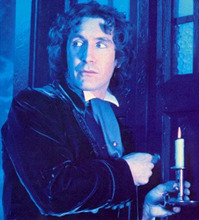
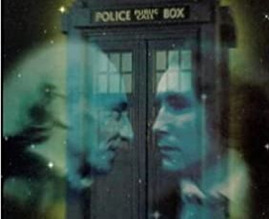
Trying to create a character around a brand new Doctor is tricky and Paul McGann’s incarnation is perhaps the biggest example for this. After 1996, he never had a TV appearance to fully flesh out the Eighth Doctor and remember: Big Finish didn’t use the Eighth Doctor until 2001. So writers in 1997 had a difficult task, especially when the Virgin Books lost the rights to the DW IP and were back in the BBC’s rights. Some Virgin New Adventure writers like Kate Orman, Justin Richards, Paul Leonard had come to write for the EDA’s, but new talent had to come in as well. They all had to intricately look at like, what, 40 minutes of McGann’s screentime in the TV Movie, half of which was the Doctor trying to figure himself out from amnesia and the other half is him being thrust into the plot without any way to truly develop his character. So… yeah, I actually can’t blame the writers finding their feet, at least with the VNA’s developing the 7th Doctor, he had 12 stories. Also, trying to pick up from the massive popularity of the VNA’s, and oh my God, I feel so bad for the writers. But, there could be a slither of a chance, maybe the magic they could have brought from the VNA’s can be replicated again. So, did it work? Hell yeah, it did!... just not under the guise of Uncle Terry Dicks. Just…screw everything about The Eight Doctors, it’s the worst possible starting point. But after that blip, yeah, it’s my favourite era of the Doctor Who IP, bar none.
Exciting Ideas
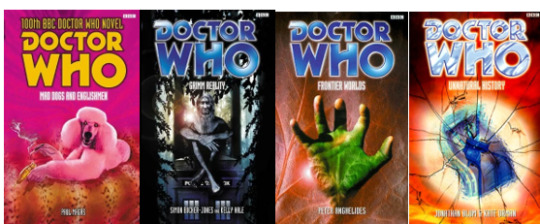
I’ll start off listing the sci-fi elements first before getting into character work. Much like the VNA’s, perhaps even more so, the EDA’s are not afraid to bring bold, extravagant ideas that TV Who could never do, perhaps not even what Big Finish could do, because of the novel format that allows descriptions and characters to fully grow. The Books are able to describe how a planet looks, feels, sounds, even down to taste so effortlessly, and a part of it is how unique, so bizarre, so beautiful these planets are, so… intimate. Could Doctor Who ever do planets like Albert (a planet entirely made out of Grimm’s fairy tales), Hitchemus (a colony world thriving on music and inhabited by intelligent tigers), The Crooked World (much like the Land of Fiction, except all the inhabitants and settings are cartoon-based). Not even Big Finish pulls off such weird and surreal settings and that’s because of the prose style allowing time and dedication to flesh out the multiple planets, without feeling clunky in its description and dialogue, which could plague early BF stories at times. But it’s not just the variety in the settings that make it great, there are also fascinating new ways to tell these stories with different formats. Narratives can be told in a Pulp Fiction-esque, out of order style (The Last Resort), told backwards (Festival of Death), books where the Doctor is barely in it but his presence is booming (Sleep of Reason), books told from the first person POV (The Turing Test, Frontier Worlds, Banquo Legacy), a narrative told from a non-fiction documentary perspective (Adventuress of Henrietta Street), a narrative told in a essay format (History 101), and that’s only a handful of the formats. There’s multiple pastiches and parodies; Trading Futures does Doctor Who crossed with James Bond harder than the Pertwee era, The Tomorrow Windows replicates Douglas Adams’ style down to a T, The Crooked World is basically Doctor Who crossed with Hanna Barbara Cartoons and many more. God, everything is so unique and wacky in this book range.
The Tone and Theming
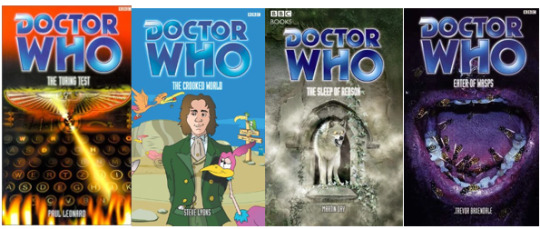
As for the Books’ tone, it’s certainly interesting. In the VNA’s, because a lot of new talent, and a lack of the BBC reigning things in as well as major inspiration from 90s cyberpunk media such as Judge Dredd, a lot of the books, especially in its first half, were extremely grimdark and gratuitous in order to show shock value for its audience (Timewryn Genesys had Ace sexually assaulted and The Doctor told her to just shrug it off and claim that it was part of the times they’re in and Warlock had unconsented bestiality and detailed animal murder). It was too far in my eyes, despite me saying that DW can be more than a franchise that is just whirling around in a magic police box. However, in the EDA’s, yes there is more sexual content, swearing like bastard, bitch and shit is still a thing, and there can be gory violence. But here’s where the EDA’s success at compared to VNA’s; it attempts to earn it’s adult elements. With the VNA’s, the grimdark nature was so constant to the point of normalisation, with hardly any degree of wonder or wit, especially from its regulars (thank God for Bernice Summerfield bringing some happiness at least). It does address and deconstruct the grimdark nature near the end, but God, even as a depressing cynical man, the likes of Blood Heat, Parasite, Warlock were just too dour for me to truly enjoy. But here, there is moderation and it feels contextual to the overall story. It enhances the story, not pollute it. The Spanish Civil War of 1936 (History 101) is written maturely and handles its mature themes in a thoughtful manner, Suicide and Depression is handled with sensitivity and intimacy (The Sleep of Reason), and when gratituous violence is used, it is detailed certainly but never glamorised and often times extremely terrifying instead of gore for the sake of gore (Eater of Wasps). Hell, even the most comical story, The Crooked World, has introspective themes of free will, the concept of death, existentialism and the value of a soul. But, it’s not all bleak, as said, The Crooked World is perhaps the most comical story since The Romans, anything involved with Iris Wildthyme as well as being weird abstract, is just laugh-out-loud hilarious, Jonathan Morris’ The Tomorrow Windows is pure Douglas Adams wacky humour, and Lance Parkin’s Trading Futures is majorly inspired by Roger Moore James Bond movies. The way the Books tackle true adult themes like Morality, Honour, Sexuality, Gender, Trauma, Redemption, the Philosophy of Nature and Identity, whilst being imaginative, humorous and endearing is… just poignant and beautiful.
The Regulars-Sam Jones
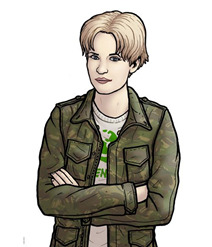
So… the regulars. Well, I’ll save the main two (The Eighth Doctor and Fitz) for last, because they will be the longest. So starting with Sam Jones (and yes, they do the ‘Smith and Jones’ shtick about a decade prior to Series 3), and off the bat, she’s easily the weakest EDA Companion and a bit of a inconsistency. She often suffered from writers who wanted to write her as the worst extremes of ‘Vegetarian Political Activist’, who constantly bitches and moans towards everything without any proper tact. And I don’t mind characters who don’t believe in tact, Cordelia from Buffy the Vampire Slayer/Angel is one of my favourite characters, but when Sam gives her opinions on everything in a pessimistic attitude without a degree of optimism… yeah my enthusiasm starts to drain really quickly. Doesn’t help that she’ll flip-flop between being a lovesick puppydog for 8, cynical activist or just… woman. But I will say that when she’s written under the likes of Kate Orman/Jonathan Blum, Paul Leonard and Paul Magrs, I absolutely love her character. She’s perceptive yet bright, naïve but willing to grow, cynical but willing to bring in entertainment. And I will say that her backstory is a fascinating deconstruction of the ‘Perfect Companion’ trope that Moffat loved to overemphasise. She had been manipulated, used as a pawn and twisted by the Doctor (although this is accidental) from the events of the TV Movie, and the real/correct one is just a junkie that couldn’t wait to stick a Heroin needle if it was given in front of her. It’s tragic, especially considering that when The Doctor fixes all his companions’ timeline much later down the line, Correct Sam becomes the correct version and it’s revealed that this version never travelled with the Doctor and died of an overdose, despite Fitz knowing her experiences they had together. I also love her exit story in Interference, she had become more enjoyable near the end and the story is able to show her resources. Unfortunately, the inconsistency up until Fitz joins just left me too much having a cold taste in my mouth for me to love her.
The Regulars-Compassion
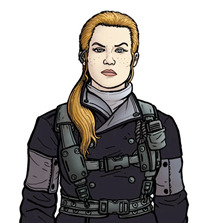
Next up, the human-TARDIS hybrid and Ice Cold Queen, Compassion. This is a character that I definitely appreciated way more after a first reading. The first time, I thought Compassion was too cold and aloof but on a reread, while she’s never going to be high on my list for favourite companions and I find her the hardest to analyse, I find that she works great as a hard-edged character, her dynamic with The Doctor and Fitz remind me a lot of 2/Jamie/Zoe, only if Zoe was way more upfront about her intelligence and rudeness. Her dynamic with Fitz as well is interesting as at first, they clearly despise each other for their clashing personalities and find each other untrustworthy but overtime, Compassion learns to enjoy Fitz’s goofiness and even learns to apologise. She can be destructive and violent with no emotion put behind it. That said, she becomes a more interesting character once she becomes the first Human-TARDIS hybrid, with the Doctor and Fitz forced to rely on her, but because of her cold hubris and after The Doctor forces a Randomiser thus violating her body, Compassion can become terrifying to The Doctor and Fitz. She does get brilliant material in The Banquo Legacy as well, with her possessing one person and her personality conflicting with the possessed person’s. And she has a decent farewell as well. Overall, I enjoy Compassion, it’s just really hard to analyse her considering that she only has 12 stories with the combination of perhaps a too subtle character arc.
The Regulars- Anji Kapoor
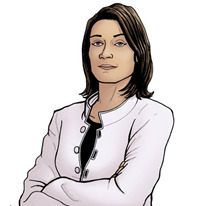
Now onto Anji Kapoor. If it isn’t for another companion that I’ll mention later, then Anji is certainly a close second in my rankings of 8th Doctor companions. And I also say with high praise that the 8th Doctor, Fitz Kreiner and Anji Kapoor team is my definitive TARDIS team… ever. You wouldn’t get that impression with her first story, as she has the trappings of an RTD Companion that you can pretty much guess a mile off. Stale relationship, life is going nowhere, working class, dead end job, jeez, I heard it all with Rose, Martha, Donna, Amy, Clara, Bill. The fact that she works in the stock market, an occupation I swear 98% of the population can barely figure out, and I felt like I was never going to like Anji. But Dang… Dang!!! The biggest glow-up happens in her very next story, and it practically sticks until her exit. I always felt that companions inbetween that period of Leela (arguably Tegan) and Anji never really basked in the pure absurdity of what world they were travelling in and never really gave any thought. The combination of new experiences around the universe and her haunting memories of her dead boyfriend was a lot to take in for her, to the point that she never really moved on (in Earthworld, she keeps writing emails to Dave, despite him being dead, and in Hope, she gives the secrets of the TARDIS over to the inhabitants on the exchange that they clone her boyfriend). She fell from grace multiple times, but with the Doctor and Fitz’s help, she was able to pick herself back up before spiralling down. What I love about Anji is despite her caring for The Doctor, she’s very distrustful to him because of his calculating and alien nature and both conflict with each other, their arguments almost feel too real. Anji often considers the options and is usually independent with her financial skills and intelligence. Over the 25 Books she’s in, she has become consistently enjoyable and a delight to read. Witty, clever, full of instinct, and humane, I did feel a proper sense of loss when she left.
The Regulars- Trix Macmillan

On the last companion, Trix Macmillan. She’s probably have the least amount of books in comparison to other EDA Companions (Sam had 25, Fitz had 51, Compassion has 12 and Anji had 25), with her only having 9 Books. Certainly not a lot of time to flesh out her character in comparison, but somehow the writers did it. What I love about Trix and what makes her a stark contrast to the first EDA Companion, Sam, is that Trix doesn’t want to be popular or well-liked. She’s logical, calculating, often devious, and often pretty tactless. She’s the kind of person who would steal a dead person’s identity and money. She treats The Doctor and Fitz not as friends, only acquaintances. But not just that, she can be (intentionally) a walking contradiction. Much like a showbiz actress, depending on what environment, time and crowd she’s working with, she’ll immediately change her personality. To the point that Trix doesn’t even know her true personality, and she is scared that she wants to know what she used to be. She likes being anyone but herself, wanting to become inconspicuous around the Doctor. Her relationship with the Doctor is interesting as well, he is judgemental towards her hobby as a conwoman, believing that she’s only with him and Fitz because she’ll steal whatever she can get. But as time goes on, he learns about her contradictory personality (most likely relates because of his own contradictory personality), and sees her, the real her. And despite her trying to detach herself from The Doctor, she slowly, but surely, opens herself more to The Doctor and Fitz, to the point that she feels hurt when The Doctor accuses her. Even with the short runtime, I found her relationship with Fitz to be really touching, and shows that Fitz’s open loyalty works in tandem with Trix’s cold secrecy. We don’t get much information about her past, but in a way I enjoy the lack of answers, whether she’s just a conartist or perhaps a chameleonic alien, what her relationship was like with her father. And maybe that’s the point, with her shape-shifting and unpredictable personality, she’s meant to be an enigma. At the very least, with 9 books, she had become a fascinating character that was wonderful to read and analyse.
The Regulars-Fitzgerald Kreiner
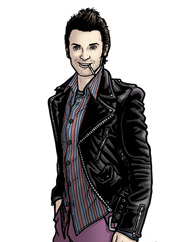
Now, my favourite companion in all of Doctor Who media, Fitz Kreiner. Better than the likes of Jamie, Donna, Sarah Jane, Ace and Evelyn. Before with Sam and The Doctor, the books were of varying quality, but as soon as he was introduced, even with a bit of a terrible debut story, he brought such humour that made the story just about bearable. He’s a bit of a goofball with some addiction for cigarettes and alcohol, but he starts becoming one of the most complex and special characters in the franchise. He begins as a bit of a James Bond-esque ‘Lady’s Man’, often trying to flirt and womanise, but by his third Book, Revolution Man, the development truly begins. He gets kidnapped, tortured and brainwashed under the influence of alien drugs and forced into shooting a man, with the Doctor forced to finish the job off for Fitz. He’s obviously going to have lasting effects that will damage him in the long run. But Damn, it doesn’t stop there, Interference leaves him in the absolute gutter with him being trapped in a membrane for 600 years, and resents the Doctor for failing to rescue him, and joins up to 8’s longlives enemy, Faction Paradox, and is converted to be a monster, becoming Father Kreiner. And it’s tragic, given his PTSD shown from Revolution Man. But that Fitz is gone, and what stays with the Doctor until the end is a clone of him, with full memories and everything. So thankfully, the loveable oaf never truly went away and only gets better from here. Much like how the 2nd Doctor was perfect for Jamie, or how Ian and Barbara are integral for the 1st Doctor, Fitz is ideal for 8. During the period with Compassion, he wants to prove that he’s the real Fitz, but can’t, because he isn’t. He may have the OG Fitz’s memories, but he can’t dream and thinks that some memories are missing. Even some aspects of his personality are different, like his skills of hiding and blending in easier. He may be a doofus, and hard to catch on certain things, but much like Jamie, he’s street-smart, and is able to spot simple situations that The Doctor wouldn’t give a second notice because of his desire for over-complicated situations. Even with him not being as bright, he’s able to hold off on his own from the Doctor, as in Trading Futures, he’s able to defeat Time Lord-wannabe Space Rhinos (no, not those kind of Space Rhinos) on his own without any of the Doctor’s help or knowledge by impersonating the Doctor, even willing to sacrifice himself. He’s the flame behind the EDA’s for me, the one who is willing to sacrifice everything he has to save whoever he considers family, and the bond that the Doctor and Fitz have together is inspired. He is fiercely loyal to the Doctor, even when he is kept in the dark. They both have a connection towards each other, like a mix between 2/Jamie and early 8/Charley, with Fitz even willing to hold the heavy memories of what 8 did to Gallifrey, even when The Doctor threatens to break every bone in Fitz’s body. He was the best friend that 8 could ever have, I loved their kindred relationship and it was totally worth it having Fitz for 51 Books to become such a developed character. My favourite companion, bar none.
The Regulars-The Eighth Doctor
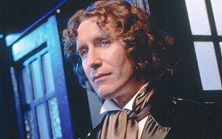
And now, finally the Eighth Doctor. Before, I used to cite the Eighth Doctor from Big Finish as the definitive incarnation. And don’t get me wrong, I still love him in the Charley, Lucie and even the Doom Coalition era. He has brilliant gravitas in showing intelligence (arguably the most intelligence since the 4th Doctor), dry morbid humour, the right amount of patronising, and enthusiasm, often excelled by McGann’s excellent performance and Shakespearean voice. But, as time goes on, the era becomes more… how do I say… schizophrenic and uneven. Big Finish sort of starts off creating arcs for 8, but then… sort of wander off and never pick up on arcs they’ve created, like the 800 year maroon in Orbis, the angst in Dark Eyes, then finally culminating with Moffat’s Night of the Doctor, not picking up on his hatred for the Daleks after Lucie Miller’s death, and making him too naïve to the Time War, making it as if his journey from BF didn’t even matter.
Then came my experiences with the books. And discarding the first novel, The Eight Doctors, and jumping straight to Vampire Science, Jonathan Blum and Kate Orman immediately gave 8 more nuance than 75% of 8th Doctor material in BF. I should preface by saying this as well: despite my grievances from the Virgin New Adventures, I still think that the character of 7, Time’s Champion and its character work are still crucial to the EDA’s and how it conflicts/supplements 8’s character. 8 is no longer Death’s pet, stuck to the chains of fate, but much like 7, in the eyes of others, he is simultaneously whimsical, dangerous and manipulative, albeit more flawed than 7. When 7 manipulates, it’s more out of logic, thinking about the bigger scope, while with 8, it’s out of passion and love. He often uses his good looks and often childlike grin as a front to scheme, as evidenced in Genocide. But unlike the 7th Doctor, it’s never constant to the point of predictability, and sometimes, even his manipulation messes up due to his conflict with his passion and childlike personality. I’d argue that 8 is the most anti-hero incarnation of all the Doctors, even more than the 7th Doctor, often obliviously selfish, privileged and at times very toxic and callous. He often doesn’t let other people in on his schemes (him faking his own death to his companions in The Banquo Legacy), often clings onto people out of fear of losing them (Sam in Interference), pulls strings for his selfish needs (uses Alan Turing’s sexuality as blackmail to make Turing help him help aliens but on the basis that the Doctor just escapes Earth in The Turing Test), puts others on the brink of death (orders a possessed wasp-human hybrid to kill one of his closest patients to test if his true personality is still there in Eater of Wasps), often be cold-blooded and violent (throws a medic against the wall head-first and then stuffs him in a cupboard in Vanishing Point). In the second half of the Book range, he had lost his memory from his battle and destruction/erasure of Gallifrey, but here’s why this memory erasure works as opposed to other ones, like in Big Finish. For Big Finish 90% of the time it’s used, it’s often to create false tension. At times, it’s fine, but when it’s used constantly to pad out the runtime, my enthusiasm starts to wane out quickly. But Justin Richards as Book Script Editor brings something interesting. For the first time, the Doctor isn’t bitching about where his memory is, but rather, he’s a mirrored version of the 1st Doctor (my second favourite incarnation): full of rage, irritative, deceptive, arrogant and willing to fill his hands full of blood. The difference is there is no Ian or Barbara to hold him back, to make him grow, 8 must be the one to grow and develop himself, he has to make the work into becoming The Doctor. That’s another reason why I adore the 8/Fitz/Anji team so much; they are all broken, damaged people with flaws, and call each other out. But they are also a trio of friendship, love, can bring unity towards each other and most importantly, feel like a family, in fact probably the most family-like team since arguably 2/Jamie/Victoria or even since 1/Ian/Barbara/Vicki. 8/Fitz/Anji have truly descended into tough times (Fitz especially), but this team shows that you can pull yourself back from the depths of hell when you have the right support going for you.
Writers like Lance Parkin, Paul Leonard, Lloyd Rose, Kate Orman, Steve Lyons, Mags L Halliday, Martin Day, Lawrence Miles live and breathe the 8th Doctor, a true Bryon Romantic, poetic and literal with words. He’s a diplomat, rather than a conqueror. He may be brutal, manipulative, and cold-blooded, but it’s equally mirrored with empathy, mischievous humour akin to the 2nd Doctor, and a lust for the unpredictability of humanity. Yet unlike how Modern Big Finish and Moffat’s Night of the Doctor made 8 into an ineffectual pacifist buffoon, Book 8 is certainly an optimist, but he’s also a realist. In Reckless Engineering, he was given the choice between saving the correct timeline in the universe but at the cost of his friends or let the universe collapse… he actually chooses the universe. It’s a shocking moment (especially for Fitz, considering how long he’s been with the Doctor), but even he knows that, but has a responsibility to save the right reality. And with some introspection, nearing the end, he realises that, because there’s a gorgeous insight in The Sleep of Reason, about focusing too much on the bigger picture and the few things is equally as important. To see 8’s goals come to fruition, he brings it to himself that his mission of helping even just one individual can be seen as the greatest thing in the universe. He doesn’t want to remember the events of Gallifrey near the end because at the end of the day, he’s a man who strives for the present and future, not the past. He may not be a good person, he may not be right sometimes, and he may not have a happily ever after with destroying Evil for good, but he’ll still keep going on just to make a difference. That’s why I adore the ambiguous ending to The Gallifrey Chronicles, we never get a confirmation as to whether the Doctor survives his plan against the Vore, we never get what his plan is supposed to be and whatever happens after the battle (besides a song from Fitz closing off the book). I prefer Doctor Who to have an ambiguous non-conclusive ending than what Marc Platt did for Lungbarrow or Colin Meek for Death Comes to Time. This version of Eight has now become the definitive incarnation of The Doctor for me, I adore this character so much.
Conclusion

To me, The Eighth Doctor Books, especially in the second half, truly encapsulates everything that I love about the franchise: superb prose, introspective themes, emotional moments, pushing the boundaries of what Doctor Who could truly do but never accomplish. The writers made something special, and made the range one of the most suspenseful, sombre, intimate, and beautiful pieces of fiction I’ve ever experienced. I love them, and to me, they are my Doctor Who.
16 notes
·
View notes
Text
All of this and more!
Not to be a dramatic purist but Dr Who will literally never be as good as it was in like 2000-2004 when the BBC books and Big Finish Eighth Doctor ranges were both going batshit at the same time. Like The Year of Intelligent Tigers, The City of the Dead, and Scherzo came out within like two years of each other. How does it feel to know Dr Who hasn’t reached this level so consistently in 15 years
189 notes
·
View notes